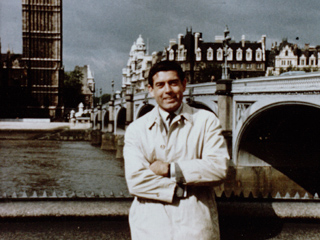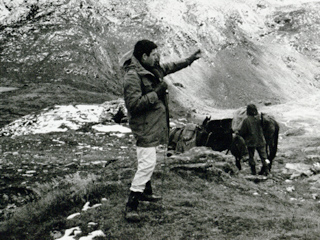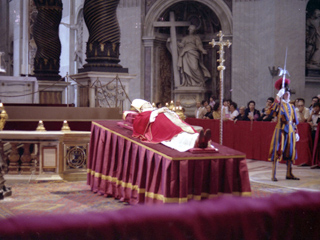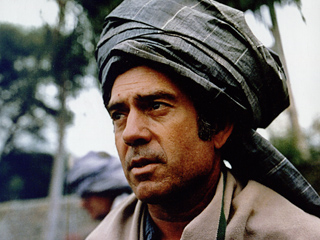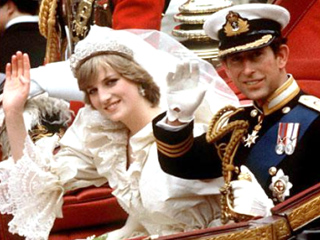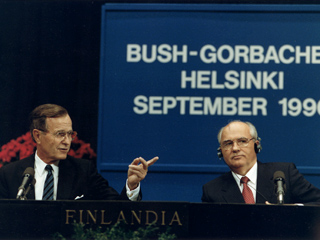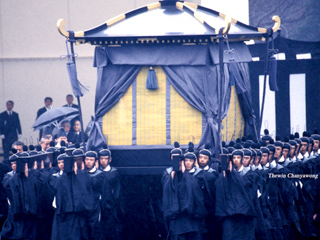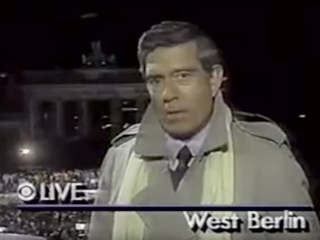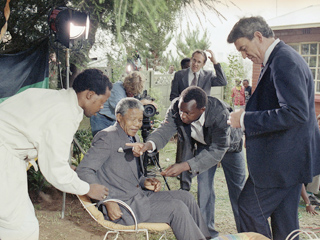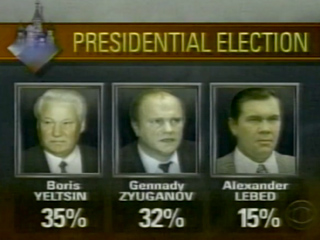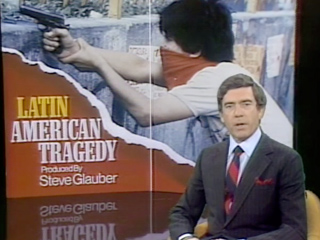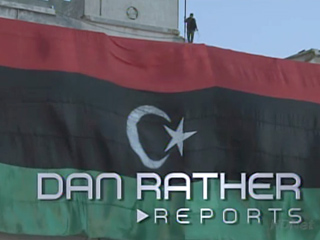Starting with the 1962 military coup in Guatemala, Dan Rather has eagerly followed, on site, the development of foreign affairs. He has reported on major events from the transfer of sovereignty over Hong Kong to the end of apartheid in South Africa. While American television news devote a relatively small amount of time to foreign news (between 6 and 11 percent in 2012), Rather made a point of giving foreign affairs a big enough space, both with the CBS Evening News and, more recently, with his new show, Dan Rather Reports on AXS TV, where he has covered stories from the plight of Iraqi refugees in Syria to the changes in Cuba.
See Foreign Affairs Additional Materials
London
In 1965, Rather moved with his family to Europe to succeed Alex Kendrick as CBS's London correspondent; the place where Ed Murrow had once reported on World War II. After Kendrick introduced him to his sources, Rather built a team that included cameramen Johnny Tiffin and Cyril Bliss. They mostly produced what is known in the trade as "civilization" or "human" pieces. A story about a group of orphan siblings fighting to stay together earned them a lot of praise. The launch of commercial space satellites such as Early Bird and Telstar and the use of videotape enabled reports from all over Europe as well as Africa and Southeast Asia. Rather reported for example on the language disputes in Belgium, followed the military coup in Greece, and flew from London to India to cover the conflict between India and Pakistan in 1965.
While in London, Rather did a story in collaboration with the British journalist David Dimbleby entitled "If You're Appalled at my Texas, I'm Bewildered by Your England." While Dimbleby reported about LBJ Ranch and the Astrodome, materialism, and obsession with guns, Rather talked about British class structure and its rigid educational system. Reviews were rather negative with the New York Times calling the piece "irritatingly parochial," and Variety bemoaning how the story "reinforced prejudices already held by viewers."
Materials
Indian-Pakistan Border
From London, Rather traveled to Southeast Asia upon hearing that Pakistan had invaded India, marking the beginning of the Indian-Pakistani War of 1965, the second conflict over the status of the states of Jammu and Kashmir. Once in India, CBS correspondent Winston Burdett filled Rather in about his contacts and the history of the region. With CBS cameraman Joe Masraff and stringer Ramnik Lekhi, Rather made his way to the front line, in the divided city of Lahore on the Pakistani side and Amritsar on the Indian side. There, they tagged along with a British-trained Indian army officer and reported on the fight between a more mobile India and Pakistan with more firepower. In the end, as Rather explained, "the difference was in leadership," and India was able to push back.
The story continued as rumors spread about a Chinese intervention. The CBS team passed through the kingdom of Sikkim on their way to Natu La Pass, a corridor through the Himalayas, through which Tibetan refugees and the Dalai Lama had fled in 1959. At 14,000 feet above sea level, Rather found Chinese and Indian soldiers facing each others in a tense stalemate. While the CBS team found no combat or invasion, CBS cameraman Carl Sorensen managed to get a rare, and dangerously close, picture of China and Chinese soldiers, at a time when the country was still completely closed off. The Indian-Pakistani conflict was the first full-scale ground combat Rather covered, and it "deepened and broadened" him as a foreign correspondent.
Materials
Death and Funeral of Pope Paul VI
The year 1978 is often remembered as the year of the three popes. Pope Paul VI's not-unexpected death on August 6 was followed by the election of John Paul I on August 26. He only reigned for thirty-three days before dying from a heart attack on September 28. A few weeks later, the College of Cardinals elected the "Polish Pope" John Paul II. As Variety noted, reporters from more than thirty-five countries traveled to and stayed in Rome to cover the events. CBS aired several specials devoted to the death and the funeral of the pontiff. Dan Rather reported from Rome on August 6 with Winston Burdett, who profiled Pope Paul VI and his times, and Jerry Bowen, who talked to villagers who kept a vigil outside of the gates of the Pope's summer residence. On August 9, Rather and Burdett, assisted by Father Jospeh Lang, commented live on the funeral procession on St. Peter Square. In the course of his career, Rather would report from numerous funerals, including former presidents Dwight Eisenhower and Ronald Reagan, Israeli Prime Minister Yitzhak Rabin in Jerusalem in 1995, as well as Mother Theresa from Calcutta and Princess Diana in London, both in 1997.
Following his election, Pope John Paul II would have an immense influence on religious but also political affairs, helping his home country Poland in its fight to liberate itself from communism. The birth of Polish trade union Solidarnosc and the eventual crackdown by the Polish government were extensively covered by U.S. networks in 1981. Rather had traveled to Poland in 1977 to look at the delicate balance between the Communist Party and the Catholic Church and had talked to Cardinal Wyszynski as well as to U.S. citizens living in Poland.
Materials
Afghanistan
Together with producer Andrew Lack, Afghan expert and translator Eden Frye, cameraman Mike Edwards, and soundman Peter O'Connor, Dan Rather traveled to Pakistan in 1980, eager to report about the Russian occupation of Afghanistan and the ensuing conflict. Once on the ground, the team decided to cross the border into Afghanistan, dressed in traditional attire. Accompanied by Afghan fighters, they traveled in the country for six days, and were able to show the Soviet presence and the type of weapons used. In addition to reporting about two refugee camps in Pakistan with an estimated half a million people, the group was able to track down witnesses and relatives of the Kerala massacre and uncovered evidence that the Soviet used nerve gas.
While the piece was praised for bringing the first images of the conflict, many criticized Dan Rather for what was perceived as a lack of journalistic impartiality, as he appeared to drum up U.S. military support for the rebels. Washington Post influential TV critic Tom Shales described the program as "in the best and worst ways typical of the program and its enterprise: punchy, crunchy, highly dramatic, and essentially uninformative." While he noted how "as usual, '60 Minutes' was effectively personalizing an otherwise abstract, distant story," Shales was critical of how the story "smacked of showy one-upmanship and theatricality." A play on the Rudyard Kipling poem and the 1939 Cary Grant film Gunga Din, the sobriquet "Gunga Dan" would, for better or worse, stay with Dan Rather for the rest of his career.
Materials
Royal Wedding
The wedding of Britain's Prince Charles and Lady Diana Spencer on Wednesday July 29, 1981, was watched by an estimated 750 million viewers across the globe. Like other networks, CBS sent its anchor, Dan Rather, from Monday through Wednesday to report from London. CBS broadcasted the impressive fireworks the night before in Hyde Park and aired continuous live coverage from 5 to 10 a.m. from its studio on the roof of the Abbey Life Insurance Co. Authors David Frost and Lady Antonia Fraser joined Rather as guest commentators on the wedding itself in St. Paul's Cathedral and the procession back to Buckingham Palace as the BBC supplied all the networks with breathtaking pictures. CBS correspondents, including Tom Fenton and Doug Tunnel, took viewers into the streets of London where over two million spectators lined the route of the bride's procession from Clarence House. Americans were caught up in the wedding fever, with viewing parties organized around the country.
In 1997, Dan Rather anchored a CBS Special Report about the funeral of Princess Diana entitled "Farewell to a Princess."
Materials
U.S.–Soviet Relations
U.S.–Soviet Relations dramatically changed in the late 1980s. Following heightened tensions after the invasion of Afghanistan in 1980 and the crackdown on Solidarity in Poland in 1981, the March 1985 appointment of Mikhail Gorbachev as General Secretary of the Communist Party of the Soviet Union and President Reagan's efforts to alleviate Cold War tensions and negotiate arms reductions led to a "détente" between the two superpowers. A series of high-profile meetings led to concrete steps. After the Geneva Summit in 1985, the 1986 Reykjavik Summit, with its focus on disarmament, set the stage for the 1987 Washington D.C. Summit where the Intermediate-Range Nuclear Forces Treaty was signed. Reagan traveled to Moscow in the spring of 1988, and Gorbachev came to New York in December of that year. The Malta Summit in 1989 was followed by the second Washington D.C. Summit in June 1990, when the Chemical Weapons Accord was signed. In Helsinki, President Bush and Gorbachev discussed the Iraqi invasion of Kuwait in September 1990, and they signed the the Strategic Arms Reduction Treaty in Moscow in July 1991. The Cold War had officially ended.
These historic meetings, after forty years of Cold War, were extensively covered by the media, which spared no costs. NBC and Tom Brokaw landed a coup when they got a long-sought interview with Gorbachev during the 1987 Washington summit, but the CBS team earned praises for its special program on the Soviet Union during for the 1988 Moscow summit. Utilizing the new Soviet policy of glasnost (openness), CBS correspondents, including Charles Kuralt, David Martin, and CBS Moscow correspondent Barry Peterson, spent a week in and around Moscow, where they took viewers into the Kremlin, on the Tran-Siberian Railroad, and inside the Soviet military. Rather, who had been in Moscow in 1974 for the Nixon–Brezhnev meeting and in 1987 for a CBS Special, was able to interview the deposed Politburo member Boris Yeltsin and literally "ran" into Gorbachev and got a short interview. CBS followed closely every development, reporting from Moscow in February 1990, when the Central Committee of the Soviet Union’s Communist Party agreed to endorse President Mikhail Gorbachev’s recommendation that the party give up its seventy-year long monopoly of political power.
Materials
The Funeral of Emperor Hirohito and Japanese Society
In February 1989, world leaders gathered in Japan to attend the funeral of Emperor Hirohito. Sending fifty-five staffers and fifteen correspondents, including Charles Kuralt, Kathleen Sullivan and Harry Smith, as well as Bernard Goldberg, Robert Krulwich, David Martin, Bruce Morton, Bob Simon, and Susan Spencer, CBS offered an unprecedented week-long series of reports from Japan entitled "U.S.–Japan: Dawn of a New Era." The five-part, eighteen-hour series involved CBS Evening News, 48 Hours, CBS This Morning, and Sunday Morning for what Rather called "the most ambitious undertaking by television in peacetime, ever." In addition to CBS's longstanding relationship with the Tokyo Broadcasting System, the undertaking was facilitated by producer Tom Bettag's experience as a Fulbright scholar in Japan. As a 60 Minutes correspondent, Rather had also traveled to Japan in the late 1978 for a story on Tokyo police and another on Japanese women.
In addition to following President Bush and Secretary of Sate James Baker, anchors and correspondents offered a multitude of stories about contemporary Japan and its history, from the five-hundred-year old Akasaka Jodojii Buddhist temple to floor of the Japanese stock exchange. The Washington Post commentated that "What is the most impressive is the quality of the pictures, the vital and stunning images of life a world away, portraits of a country and a people with which Americans have been obsessed but, so far as American media goes, painfully underinformed." In 1993, CBS covered extensively President Clinton's trip to Tokyo for his first international summit.
Materials
The Berlin Wall and the Fall of Communism in Eastern Europe
On November 9, 1989, the Berlin Wall, symbol of the Cold War for thirty years, came down. It was one of the stunning events between 1989 and 1991 that led to the fall of communism in Eastern Europe and the Soviet Union. Soviet Union president Mikhail Gorbachev's policy of glasnost (transparacy) and perestroika (restructuring), as well as his refusal to send Soviet troops, emboldened reformers in Eastern Europe. The independent Polish trade union Solidarity won the first free elections in June 1989, and Hungary adopted a new constitution in October. In November, the Berlin Wall fell after months of demonstrations by East Germans and the Communist government of Czechoslovakia resigned. Only in Romania was the transition violent due to the resistance of dictator Nicolae Ceausecu. Bulgaria and Albania liberated themselves in 1990 and 1991 respectively. Germany was reunified in 1990, and Boris Yeltsin, the successor to Gorbachev, oversaw the dissolution of the Soviet Union after a failed military coup in August 1991.
All major anchors were on site for this monumental event. Rather landed an interview with former West Berlin Mayor and Chancellor Willy Brandt and eventually climbed on top of the wall himself. Producers Bettag and Reade remember the elbowing to get a good shooting position, even if it meant standing on a cherry picker. Everybody understood what a tremendous moment this was. Sensing that the story would not stop in Berlin, Rather talked to the ambassador to Germany, Vernon Walters, who directed him to Prague. There Rather sat with a Czech dissident as well as with the Prague ambassador Shirley Temple and announced, correctly, that Prague would soon be next. CBS News produced a series of reports entitled "The Changing Face of Communism," that followed the developments from Prague, Rome (for the Soviet-Papal visit), and Malta for the summit.
Materials
South Africa and the End of Apartheid
The release in 1990 of Nelson Mandela after twenty-seven years in captivity was extensively covered by American television. All three major anchors (Tom Brokaw, Peter Jennings, and Dan Rather) traveled to South Africa, as did Bernard Shaw of CNN and Ted Koppel from "Nightline," who received a lot of praise for his coverage. Koppel, who had done a series about the country in 1985, got an exclusive interview with President F. W. de Klerk and later organized a town meeting at the University of Witwatersrand in Johannesburg with representatives of the South African races and political parties. As Broadcasting reported, there was no "first" interview: "Mandela's 'hospitality committee' arranged for a series of 10 minute interviews . . . for each of the U.S. networks and a number of foreign news organizations," in the backyard of Mandela's old home in Soweto. Talking to Rather on February 14, 1990, Mandela commented on tribal warfare and recalled his internment. He praised wife Winnie and said he always had hopes of freedom. Correspondent Bob Simon did a piece on the mood in Cape Town.
CBS News covered the 1994 election and the violence leading up to it. Rather interviewed Nelson Mandela and President de Klerk on the eve of the first free election in South Africa. He also did a piece on the experience of the neighboring country Zimbabwe and talked to president Mugabe about its transition from apartheid. Producer Tom Bettag recalls the competition among the journalists to get an interview with the African National Congress leader, and he remembers very vividly the lasting impression Mandela left on everyone around him.
Materials
Post-Communist Russia
An unintended consequence of Gorbachev's policies of perestroika (restructuring) and glasnost (transparency) was a wave of democratization that spread through Eastern Europe in the fall of 1989. It destabilized the Soviet Union, which struggled to stay intact, as its members demanded independence. Gorbachev faced internal political pressures from both Boris Yeltsin and the pluralist movement, who advocated rapid reforms, as well as from the hard-line Communist elite, who were against reform. After Yeltsin became the first directly elected president in Russian history in June 1991, an unsuccessful military putsch in August weakened Gorbachev and propelled Yeltsin and the democratic forces to the forefront of Soviet and Russian politics. Fearing another coup, the fifteen former Soviet Republics declared independence, and twelve of them later joined the newly created Commonwealth of Independent states (CIS). The Soviet Union was officially dissolved on December 26, 1991.
Post-Communist Russia faced a series of dramatic obstacles in the 1990s as it tried to move to a market-oriented economy, implement political reforms, and redraw political boundaries while remaking itself into a new national state. The country experienced a constitutional crisis in 1993, a contested election in 1996, and a financial crisis in 1998, as well as two wars in Chechnya in 1994 and 1999. President Bill Clinton worked closely with Soviet leader Boris Yeltsin, whom he met eighteen times. Since 1999, Vladimir Putin has been either prime minister or president of Russia.
https://danratherjournalist.org/ground/foreign-affairs#overlay=node/3095/editU.S. television news reported extensively on these developments in the early 1990s. Soviet news made up 70 percent of the twenty-two minutes on CBS Evening News in February 1990, for example. The networks were once again mobilized for the July 1990 Party Congress in Moscow and for the July 1991 Moscow summit. Like everybody else, they were taken by surprise by the August 1991 coup. Rather, as noted by the Los Angeles Times, "effectively teamed up with eloquent Sovietologist Stephen Cohen." The CBS anchor traveled back to Moscow in 1996 to report on the contested election. Rather has continued to report regularly about the country, for example in 2011 about the election of Putin for a third term.
Materials
Latin America
Starting with his coverage of the 1962 coup in Guatemala, Rather traveled to and did numerous stories about Latin America. In addition to interviewing Cuban leader Fidel Castro a dozen times, he did two stories on El Salvador: a 60 Minutes piece in 1980 when he talked to the U.S. ambassador and the president of the country, and a year later he hosted "The Struggle for El Salvador," a CBS News Special Report with reports from Ike Pappas, Charles Collingwood, David Dow, and Robert Pierpoint. He investigated Nicaragua's bloody civil war, and he sat in 1978 with dictator Anastasio Somoza and Sandinista revolutionaries. In 1986, CBS followed closely the so-called Iran-Contra affair, which started when President Reagan asked Congress to send more aid and money to the Niacaraguan rebels. Rather also went to Mexico and talked to Mexican President Jose Lopez Portillo about the country's national oil reserve in 1979.
In the late 1970s, the Carter's administration's policy of stressing human rights and non-interventionism was tested by events such as the revolution in Nicaragua and the increasing violence in El Salvador. President Reagan's policy of supporting clandestine guerrilla forces increased the instability in the region. In 1982, the ninety-minute CBS News Special "Central American in Revolt" anchored by Dan Rather featured Bill Moyers on El Salvador, Mike Wallace on Nicaragua, and Ed Rabel on Guatemala. In "American Secret War" Rather looked at the U.S.-trained commandos sent to fight the war on drugs in Colombia and the death of Captain Odom on a mission in the country in 1999. In 2004, he talked about the hostages held in the Colombian jungle and sat with Colombian President Santos in 2012. He also reported on the agonizing conditions of Central American migrants, sat in 2008 with Bolivian President Morales to talk about the country's cultivation of coca, and investigated the changes in Cuba.
The journalist also looked at U.S. relations with Mexico, especially the war on drugs and issues of immigration. He talked to the residents of Eagle Pass, who think it is a multibillion dollar waste of money, and to their mayor, who is trying to stop the federal government's border fence. He also went to the Arizona desert to examine the problem of illegal immigration. Looking at the drug problem that plagues for Mexico and the U.S., Rather investigated the growing violence in Mexico's northern border cities and looked at how newly elected Mexican President Calderon sent thousands of troops to take on the drug cartels. He followed the Bush administration's proposal for hundreds of millions of U.S. tax dollars to go to Mexico to fight the drug cartels. In 2011, he traveled to Mexico City to meet with experts and observers to find out what is happening behind the scenes and what the future holds.
Materials
The Middle East
Throughout his career, Dan Rather has closely followed the developments in the Middle East. In addition to the situations in Israel and Palestine, Rather reported on many aspects of the conflicts and everyday lives in Iraq and Afghanistan. He also investigated Iranian money laundering, a story for which he received an Emmy in 2009. As the Arab Spring exploded in 2011, Rather sat with expert Fouad Ajami and looked closely at the impact of the Arab Spring on Egypt. He also talked to Robert Mahoney from the Committee to Protect Journalists about the work of the press in Egypt. He sent two of his reporters to Libya to look a at the fight between rebels and the ruthless tyrant Gaddafi and, in 2012, did a special on the situation of the country a year after the fall of Gaddafi and the aftermath of the attack on the American diplomatic compound in Benghazi.
From 2011 on, Dan Rather Reports did several stories about Syria, looking at Syrian refugees in neighboring Jordan, freedom fighters, and the televised revolution in the country. Rather also traveled to Bahrain to look into the democratic efforts, coming back with impressive images of a volatile situation in the oil country. Sailing through the Strait of Hormuz on board of the aircraft carrier USS Carl VInson, Rather witnessed the heightened tensions between the United States and Iran in the Persian Gulf.


